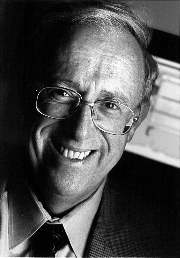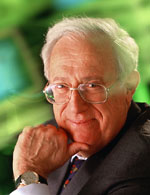.
Ονειρεύομαι ακόμη τον Ελληνισμό σε όλη την οικουμένη να χρησιμοποιεί τη νέα τεχνολογία της πληροφορικής για να δενόμαστε σφιχτά, ο ένας με τον άλλο, οι Έλληνες της διασποράς συνάμα με τους Έλληνες της Μεσογείου, δημιουργώντας έτσι μια νέα Ελλάδα
Griechische Wissenschaftler: Michael Leonidas Dertouzos

Computer scientist Michael Dertouzos played a central role in establishing the World Wide Web as an international standard. Dertouzos was director of MIT's Laboratory for Computer Science since 1974, used his influence among academics, industry and government officials to broker creation of the World Wide Web Consortium in 1993 to oversee development and insure the independence of the Web.
“At that point, I had a half-formed crazy idea. He played an absolutely key role,” Tim Berners-Lee, inventor of the World Wide Web, said in a telephone interview, referring to his close friend's role in forming a consortium that elevated the Web beyond narrow governmental or business interest control. “He picked up the idea (of forming the World Wide Web Consortium) and put it together. Only someone with this stature could have pulled it off”
Born in Athens, Greece, Dertouzos joined the MIT faculty in 1964 and for decades used his position at one of the world's leading technology research institutions to prod the industry to make computers more accessible to nontechnical audiences. In books such as “The Unfinished Revolution” and at the podium of international forums, he argued passionately for making computers more “humancentric” and easier to use, like cars or simple electronic appliances.
“We made a big mistake 300 years ago when we separated technology and humanism,” Dertouzos said in a 1997 interview in Scientific American magazine. “It's time to put the two back together.”
Dertouzos, whose father was an admiral in the Greek navy, would later recall that his earliest memories were of war-torn Athens and of people starving in the streets, an experience that helped instill an active social conscience later in life.
Under his tutelage at MIT's computer lab, researchers and alumni produced a string of critical innovations, ranging from time-shared computers to spreadsheets, encryption and key Internet technologies. In 1968, he formed Computek Inc. to create and market one of the earliest computer graphic display terminals, based on his patents. He also backed several key high-tech start-ups, including one-time videoconferencing leader PictureTel and RSA Security Inc. (Nasdaq:RSAS - news), the software encryption pioneer of technology that helps computer users keep data private.

Colleagues of Dertouzos remember him as a visionary who championed the development of technology with an eye towards human utility. “He set an incredible percentage of the agenda for computer science [in the past several years],” Professor of Electrical Engineering and Computer Science Harold Abelson PhD ’73 said. “He was the first guy who said we should use computers for education, back when we had about ten computers on campus.”
In 1975, he went around with this crazy idea that someday there will be computers in the home,” Abelson said. “[Michael] thought of things years before anyone else did. While often suffering ridicule prematurely, he was invariably vindicated eventually. For example, in 1980, he wrote and spoke about the Information Marketplace, in which hundreds of millions of computers would be interconnected via a worldwide network to enable billions of people to create, access, and freely exchange information. It took nearly twenty years for the Internet and the Worldwide Web to prove him right,” said Associate Director of LCS Victor W. Zue SCD ’76.
More recently, LCS spearheaded the $50 million Oxygen project in 1999 in conjunction with MIT's Artificial Intelligence Lab. Oxygen aims to make computers easier to use, ''as natural a part of our environment as the air we breathe.”
Dertouzos' concept of the “information marketplace,” which he first wrote about in 1980, offered an ambitious vision of networked computers that prefigured the World Wide Web, according to Berners-Lee.
The academic also helped create the consortium behind the X-Window system, an effort in the mid-1980s to unite various flavors of software to make computers easier to use. Berners-Lee relied on it to develop the World Wide Web.
After the two met in 1993, Dertouzos cleared the way for Berners-Lee to move from Switzerland, join him at MIT and form the World Wide Web Consortium. While at CERN (news - web sites), the European Particle Physics Lab in Geneva, Berners-Lee first developed the Web as a graphic information-sharing system for a global network of physicists.
Dertouzos holds patents for a graphical display system, an incremental photoelectric encoder, a graphic tablet, and for a parallel thermal printer. Dertouzos has written numerous books, including the best-seller “What Will Be” (1997) and “Made in America” (1986). His latest book, “The Unfinished Revolution: Human Centered Computers and What They Can Do for Us” (2001), discusses the need to make computers more accessible and easier to use.
Bill Gates of Microsoft recently wrote about Dertouzos: "He was the first real technology humanist who believed that technology was largely worthless unless it truly enhanced human life, human communication, human work and play."
Links
http://philippos.mpa.gr/gr/other/dertouzos/index.html (Additional Information in Greek from Spiros Kouzinopoulos)
| Ancient Greece
Science, Technology , Medicine , Warfare, , Biographies , Life , Cities/Places/Maps , Arts , Literature , Philosophy ,Olympics, Mythology , History , Images Medieval Greece / Byzantine Empire Science, Technology, Arts, , Warfare , Literature, Biographies, Icons, History Modern Greece Cities, Islands, Regions, Fauna/Flora ,Biographies , History , Warfare, Science/Technology, Literature, Music , Arts , Film/Actors , Sport , Fashion --- |
Retrieved from "http://en.wikipedia.org"
All text is available under the terms of the GNU Free Documentation License

